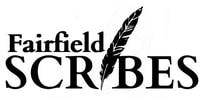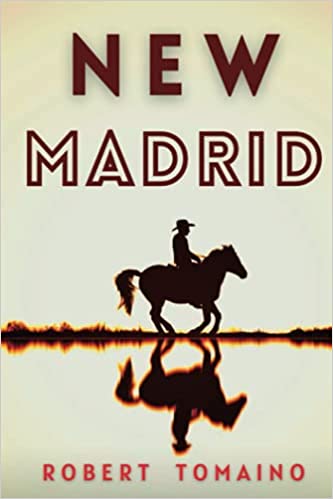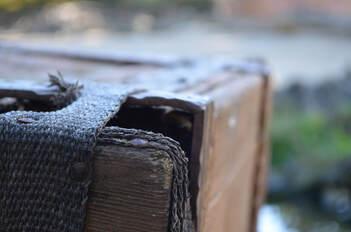ScribesMICRO
* * * Managing Editor: Edward Ahern * * *
* Submissions Editor: P.C. Keeler *
* Submissions Editor: P.M. Ray *
* Associate Editor: Alison McBain *
* Submissions Editor: P.C. Keeler *
* Submissions Editor: P.M. Ray *
* Associate Editor: Alison McBain *
Issue # 10
October 15, 2021
Featuring the short scribblings of:
* David G. Boston * Salena Casha * RC deWinter *
* Samuel Edwards * Jon Fain * Denny E. Marshall *
* Marcelo Medone * Matthew P.S. Salinas *
* Richard Seltzer * Bart Van Goethem *
* David G. Boston * Salena Casha * RC deWinter *
* Samuel Edwards * Jon Fain * Denny E. Marshall *
* Marcelo Medone * Matthew P.S. Salinas *
* Richard Seltzer * Bart Van Goethem *
Book Review
New Madrid by Robert Tomaino
Reviewed by P.M. Ray
|
Fiction
|
The Only Day by Matthew P.S. Salinas It was the only day that mattered. No one had come to help out. They only came to condemn and fear what had transpired. Tears were pointless; it was a moment beyond reason or emotion. The sirens and ambulance lights had both faded into memories.
The bed was cold and the staff were unaccommodating. The shackles which held him to the wheelchair were as cold as his family’s eyes, watching him as he was wheeled away. Taken away beyond the doors into the unfathomable depths of a labyrinth. It was the only day that mattered, and everyone had failed him. * * * Matthew P.S. Salinas is an author from Illinois who writes short stories in all genres and poetry. He has two published works and is continuing to publish two more books by the end of the year. He lives with his wife Jordana and their two cats.
Hope by Richard Seltzer Pandora was furious. When she won the dance competition, rather than take cash, she chose the sealed box that contained a gift from the gods. But the box was empty.
She could have gone on a cruise to Mykonos or Rhodes. Instead, she got nothing. Her friend Pollyanna disagreed. "Nothing? I call that everything. That's a chest that could hold whatever treasures you find or make. Dream big dreams and work toward them, using this chest to save what you'll need." Pandora followed her advice and lived a happily-ever-after. And for many generations, parents gave their children boxes for them to fill, making them hope chests. * * * Richard Seltzer graduated from Yale (long, long ago), where he had creative writing courses with Robert Penn Warren and Joseph Heller. All Things That Matter Press recently published five of his novels, Parallel Lives, Beyond the 4th Door, Nevermind, Breeze, and Shakespeare's Twin Sister. His personal website is seltzerbooks.com.
Shut Off for Non-Payment by David G. Boston This was the part of the job the Pipefitter hated. Shutting off people’s gas, especially in the middle of winter. He opened the street cap and placed the wrench on the shut-off value, when he heard a voice.
“Hey, Mister, are you gonna cut the gas off in this house?” He looked up to see a little Black girl about ten or eleven years old. “Yep, gonna cut it off,” he said. “Do I have time to fry me an egg?’ He looked intently at her, then said, “Oh, go ahead, fry your egg.” And then he waited for her. * * * David G. Boston was born in Bridgeport, Connecticut. He is a former United States Marine. He had a twenty-seven year career in Law Enforcement. David has been writing poetry since he was a teenager. His poems have been published in: The Bridgeport Post, Bean Fest Magazine, The Poetry Guild, Connecticut River Review, Long River Run, and The International Library of Poetry. He is also a professional stage and film actor.
Siren Call by Samuel Edwards They call her a Siren. A mythical creature with cruel intentions, dangerous and enchanting and a killer of men. They warn children about this monster, to flee from her voice lest they be dragged to a watery grave.
They call her a Siren. I call her Michelle, and we’ve been dating for six months now. Sure, there’s obstacles. She keeps arranging trips to the beach. She wants me to buy a boat. And when she sings in the shower, I get weak at the knees. They say love is blind; hopefully, it’s deaf too. * * * Samuel Edwards was born and raised in Leeds, England, and no matter how far away he gets, he is always compelled to return to Yorkshire. He has a Bachelor of Arts Honours Degree from the University of Leeds, and enjoys dark coffee, even darker chocolate, and long walks. Samuel writes mainly to impress his pet cat, a feat he will never accomplish.
|
We Live Close to Things That Can Kill Us by Salena Casha You introduce your dairy allergy first and hide the number of beers you drank behind tinted moisturizer and caffeinated eye cream. The makeup sits like a milk skin, filmy and cracked when moved.
Someone you could never share dessert with breaks your heart, and it takes a pint of Ben and Jerry’s to hospitalize you. “They add calcium to everything now,” the nurse says, eyeing your historic osteopenia. You want to tell her you hide chocolate bars around your house like cyanide tablets. Instead, you say, “I milk my own almonds.” Because, you know, some natural things can’t be helped. * * *
Salena Casha's work has appeared in over fifty publications in the last decade. Her most recent work was published in Levitate Magazine, Cerasus Magazine, and Reflex Fiction. She survives New England winters with good beer and black coffee. Follow her on twitter @salaylay_c.
First Steps by Marcelo Medone The coroner filled out the last forms, quickly checked that everything was in order, turned off the lights, and left the room.
In the solitude and deathly silence of the morgue, something moved. First, a slight shudder. Then, a spasmodic jolt shook the sheets that fell abruptly. The clatter of overturned steel utensils echoed through the spacious room until it was finally extinguished. No alarm sounded and no one seemed to notice. The corpse got up from the autopsy table and began to walk awkwardly across the gleaming tile floor, naked and crossed with surgical scars. It was learning to be a zombie. * * * Marcelo Medone was born in Buenos Aires, Argentina, in 1961. He is a fiction writer, poet and screenwriter. His fiction and poetry have received numerous awards and have been published in magazines and books, individually or in anthologies, in multiple languages in more than 40 countries, including the US.
Human by Bart Van Goethem William reads the CAPTCHA: “Before we subscribe you, you need to confirm you are a human.” He stares at his laptop, the only source of light in the empty apartment. He moves his finger to the mousepad, but his hand starts to tremble. “I am a human,” William says out loud, in an attempt to convince himself. He looks at the broken pane of glass in the door that he still hasn't replaced and closes his laptop. He decides to call Eve, even though it's already late in the evening. He listens intently to the ringing tone.
* * * Bart Van Goethem. Micro and flash fiction writer from Brussels, Belgium. Also drummer and Real Racing 3 player. Read all his published stories on bartvangoethem.com.
Vombie by Denny E. Marshall It’s pitch black outside. The vampire can smell a female nearby.
He grabs her from behind and sinks his fangs into her neck. There’s no blood in her veins. Her face is covered in blood, so the vampire licks it off. She’s a zombie. They have sex. Nine months later, a child is born that is neither vampire nor zombie. A new creature exists. A vombie. The child feeds differently than its parents. Vampire hunters and police investigators are stumped by recent homicides that have one common thread. Two holes in the back of the neck and the brains sucked out. * * * Denny E. Marshall has had art, poetry, and fiction published. Some recent credits include cover art for The Society Of Misfit Stories June 2021 and fiction at Potato Soup Salad August 2021. In 2020 his website celebrated 20 years on the web. The website is www.dennymarshall.com.
What Happens in the Rialto by Jon Fain The drapes close, hiding the screen like it’s a secret pool. With customers out the exits, Philip sweeps the veneer of decades-old popcorn grease and soda stains.
Finished, he brings up the whiskered head and flicks away the bits. The broom sighs, leaning its business end on Philip’s shoulder, its bristles pecking his cheek. As they dance, Philip’s feet smooch the sticky floor, the broom’s handle tapping out the humming beat. Later, in the dark closet, the broom can’t stay put away. Inflamed from what has happened, it slides down along the wall toward the mop, innocent in its bucket. * * * Jon Fain’s micro fiction has been published in Molecule, Star 82 Review, The Daily Drunk, The Dribble Drabble Review, The Drabble, Scribes Micro Fiction, Six Sentences, and Blink-Ink. He lives in Massachusetts.
|
Poetry
|
the challenge by RC deWinter some things can be perfect
a painting a song the weather hell even a pie but never us no one living or dead ever was is can be but that doesn’t mean even burdened as we are with flaws and limitations we shouldn’t try to become the best incarnation of our primal selves we can be as we navigate time and space to wherever it is we’re going imagine a world with everyone dedicated to light not dark love not hate failure is guaranteed but think – think! how much closer to what we call paradise we’d be if we tried * * * RC deWinter’s poetry is anthologized, notably in New York City Haiku (NY Times/2017), Coffin Bell Two (Coffin Bell/2020) in print: 2River, Adelaide, Event, Genre Urban Arts, Meat for Tea: The Valley Review, the minnesota review, Night Picnic Journal, Prairie Schooner, Southword among many others and appears in numerous online publications.
|
|
The Poets' Salon
If you're looking for more poetry, including a place to read your work, receive critiques, and explore poetic forms, check out The Poets' Salon. Two editors of ScribesMICRO, Edward Ahern and Alison McBain, run this free poetry workshop. Meetings take place on the second Saturday of every month from 10 a.m. to noon EST via Zoom. More info, including how to sign up for the poetry workshop, can be found on The Poets' Salon website or via Meetup. |











